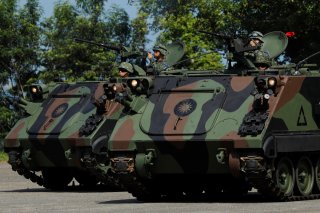Taiwan Is Rapidly Preparing for War with China. Will It Be Enough?
Taiwanese officials announced earlier this month that the Army’s command structure is being overhauled to facilitate joint operations between its services.
Here's What You Need to Remember: “Taiwan ‘independence’ means war.” In early April, Chinese officials boasted that Taiwan’s military “won’t stand a chance” if China chose to invade. Beijing’s recent military bluster is not entirely unfounded: according to a series of wargames held in prior years, current U.S. military assets in the Pacific region likely cannot prevent the “fait accompli” of Taiwan’s conquest.
Amid soaring tensions between Taipei and Beijing, Taiwan is pursuing a major army restructuring effort.
Taiwanese officials announced earlier this month that the Army’s command structure is being overhauled to facilitate joint operations between its services, as reported by Defense News. The restructuring will likewise empower regional commanders to make operational decisions in the event of a conflict, with the Army’s various defense commands being rebranded as distinct “combat theater commands.” Specifically, Defense News reports that the Penghu, Huadong, Sixth, Eighth and Tenth Army corps will be renamed the first to fifth commands and given jurisdiction over the eastern, northern, southern, and central parts of the country, respectively. Theater commanders—currently all Army generals, though the position may be opened to officers from other service branches in the future—will have broad leeway to coordinate the forces in their respective region. The government maintains that this recent round of decentralization will improve the performance of local forces and mitigate the effects of potential electronic warfare operations targeted at the country’s communication systems.
The announcement follows a major December 2020 reform package, aimed at raising minimum standards for all military personnel. The new regulations stipulate that personnel who receive a grade of “C” or lower on their evaluations will be discharged, whilst also greatly shortening the discharge process. In addition to major personnel and command structure reforms, Taiwan is forging ahead with a series of ambitious military modernization projects. The country is launching a domestic submarine industry, with its first indigenous attack submarine slated for completion in 2024.
The reorganization comes during a broader effort by Taiwan to grow its capabilities in the face of mounting threats and provocations from Beijing. Taipei’s current approach is guided by the Overall Defense Concept (ODC), a doctrine aimed at deterring and—if need be—defeating a Chinese invasion of Taiwan.
China’s People’s Liberation Army (PLA) made a record 380 incursions into Taiwan’s ADIZ (air defense identification zone) in 2020, according to a Taipei-based think tank. In March, Taiwanese officials reported the largest-ever Chinese incursion into the country’s ADIZ. That incursion involved twenty Chinese aircraft, including four nuclear-capable H-6K bombers and ten J-16 fighter jets. China’s forays into Taiwanese airspace are accompanied by increasing naval pressure, with Chinese officials announcing that the People’s Liberation Army Navy will hold regular drills near Taiwan.
In recent years, Chinese officials and state media have employed increasingly belligerent rhetoric toward Taiwan, which Beijing has long considered to be a breakaway province. “We warn those ‘Taiwan independence’ elements: those who play with fire will burn themselves,” Chinese Defence Ministry spokesman Wu Qian said in January. “Taiwan ‘independence’ means war.” In early April, Chinese officials boasted that Taiwan’s military “won’t stand a chance” if China chose to invade. Beijing’s recent military bluster is not entirely unfounded: according to a series of wargames held in prior years, current U.S. military assets in the Pacific region likely cannot prevent the “fait accompli” of Taiwan’s conquest.
Mark Episkopos is a national security reporter for the National Interest. This article is being republished due to reader interest.
Image: Reuters

